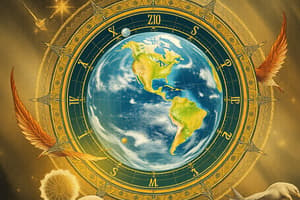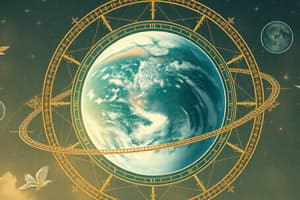Podcast
Questions and Answers
What is the duration of one complete rotation of the Earth?
What is the duration of one complete rotation of the Earth?
- 24 hours
- 23 hours and 59 minutes
- 365 days
- 23 hours, 56 minutes, and 4 seconds (correct)
What primary effect is caused by the Earth's revolution around the Sun?
What primary effect is caused by the Earth's revolution around the Sun?
- The changing seasons
- The Earth's magnetic field
- The calendar year (correct)
- The day-night cycle
Which location on Earth is located at the midpoint between the North and South Poles?
Which location on Earth is located at the midpoint between the North and South Poles?
- Prime Meridian
- Antarctic Circle
- Equator (correct)
- Tropic of Cancer
What angle is the Earth's axis tilted from the perpendicular to the orbital plane?
What angle is the Earth's axis tilted from the perpendicular to the orbital plane?
How long does a tropical year take?
How long does a tropical year take?
Which of the following is NOT considered a small-scale motion of the Earth?
Which of the following is NOT considered a small-scale motion of the Earth?
Which plane describes the path the Earth takes around the Sun?
Which plane describes the path the Earth takes around the Sun?
What is the basic unit for measuring days based on the Sun's position?
What is the basic unit for measuring days based on the Sun's position?
What is a distinctive feature of a leap year?
What is a distinctive feature of a leap year?
What defines the directional spin of the Earth on its axis?
What defines the directional spin of the Earth on its axis?
Flashcards
Earth's rotation
Earth's rotation
The spinning of Earth on its axis, from west to east.
Rotation axis
Rotation axis
Earth's imaginary line between the North and South Poles, around which Earth spins.
Sidereal day
Sidereal day
The time it takes for Earth to complete one full rotation with respect to the stars.
Solar day
Solar day
Signup and view all the flashcards
Earth's revolution
Earth's revolution
Signup and view all the flashcards
Tropical year
Tropical year
Signup and view all the flashcards
Leap year
Leap year
Signup and view all the flashcards
Ecliptic plane
Ecliptic plane
Signup and view all the flashcards
North Pole
North Pole
Signup and view all the flashcards
Equator
Equator
Signup and view all the flashcards
Study Notes
Planetary Motions
- Earth experiences various motions through space, categorized by scale
- Large-scale motions: The Earth moves with the Solar System and galaxy, revolving around the center of the Milky Way galaxy
- Small-scale motions: Cause Earth's position to constantly change relative to the Sun, dictating day/night cycles and seasons
- These motions are rotation and revolution
Rotation
-
Rotation is the spinning of Earth on its axis, from west to east
-
Essential for defining basic locations on Earth: North Pole, South Pole, and Equator
-
One complete rotation (sidereal day) takes 23 hours, 56 minutes, and 4 seconds
-
The basis for our 24-hour solar day
-
Earth's axis isn't perpendicular to the ecliptic plane (the plane of Earth's orbit around the sun) but is tilted at 23.5 degrees
Revolution
- Revolution is Earth's orbit around the Sun
- It defines the basis for our calendar year
- One complete revolution (tropical year) takes 365 days, 5 hours, and 49 minutes
- Calendar years are usually 365 days, with a leap year (extra day in February) every four years to account for the extra time
- Earth orbits the sun in the same direction as other planets, on a plane called the ecliptic
Studying That Suits You
Use AI to generate personalized quizzes and flashcards to suit your learning preferences.



